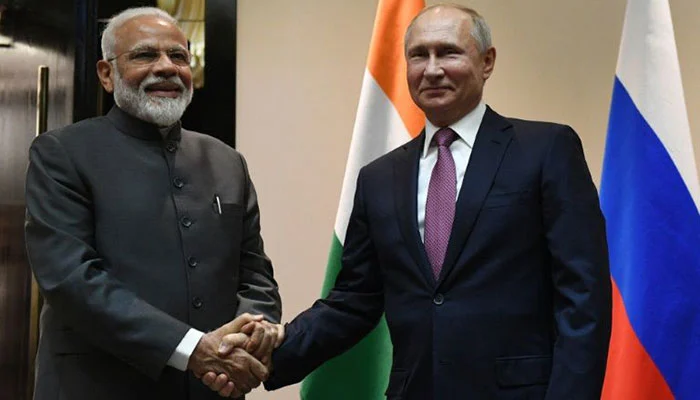Since Russia’s all-out invasion of Ukraine began on February 24, the Indian government and large segments of the Indian public have been staunchly on Putin’s side. On Indian social media, hashtags like #IStandWithPutin and #IstandWithRussia trended, and the Indian government demonstrated – perhaps most notably by refusing to support UN resolutions condemning the invasion – that it is unwilling to jeopardise its strong ties with Russia over Putin’s actions in Ukraine.
The Indian response to the situation in Ukraine is neither surprising nor unusual. Relations between Moscow and New Delhi have been shaped by a “high degree of political and strategic trust” since the establishment of diplomatic ties following India’s independence in 1947. Russia and India have frequently taken similar positions and supported each other on contentious international issues over the years.
A partnership based on mutual trust
Moscow saw its alliance with India as critical to countering American and Chinese dominance in Asia from the start. And, in international politics, India has always benefited from the leverage that support from a major power like Russia provides.
After India used its military to end Portuguese colonial sovereignty over Goa, Daman, and Diu, for example, the United States, the United Kingdom, France, and Turkey issued a resolution condemning India and urging its government to withdraw its troops immediately. However, the Soviet Union was opposed to the proposal.
India and the Soviet Union signed the “Treaty of Peace, Friendship, and Cooperation” in 1971. The treaty formalised India’s alliance with what was then a superpower, arguably ensuring India’s dominance in South Asia.
The Soviet Union’s and later Russia’s unwavering support for India on the Kashmir issue has also been unwavering and politically significant. In 1955, Soviet leader Nikita Khrushchev declared support for Indian sovereignty over Kashmir, saying, “We are so close that if you call us from the mountain tops, we will appear at your side.” Moscow has been a bulwark against international intervention in Kashmir since then.
The Soviet Union vetoed UN Security Council resolutions calling for international intervention in Kashmir in 1957, 1962, and 1971, insisting that it is a bilateral issue that must be resolved through negotiations between India and Pakistan. It also took a similar stance on the Indo-Pak conflict as a whole. In India, such a stance was praised across the political spectrum.
For example, in 1978, then-Foreign Minister Atal Bihari Vajpayee – a founding member of the right-wing, Hindu nationalist Bharatiya Janata Party (BJP) who served as India’s prime minister between 1998 and 2004 – put aside ideological differences with the Soviet Union and greeted a Soviet delegation to India with the words, “our country found the only reliable friend in the Soviet Union alone.”
Russia has worked hard to maintain its special relationship with India since the fall of the Soviet Union.
Russia’s President Vladimir Putin and then-Prime Minister Atal Bihari Vajpayee signed a “Declaration of Strategic Partnership” in 2000. Both countries signed the “Special and Strategic Partnership” in 2010, commemorating a decade of this strategic partnership. Russia reaffirmed its pro-India stance on Kashmir as part of this special partnership. When India repealed Article 370 of its constitution, which granted Jammu and Kashmir special status, the Modi government faced harsh international criticism, but Russia once again dismissed this as a “internal matter” for India.
Following a China-led push for international intervention in Kashmir in January 2020, Russia’s first deputy permanent representative to the UN, Dmitry Polyanskiy, tweeted, “UNSC discussed Kashmir in closed consultations.” Russia is adamant about normalising relations between India and Pakistan. We hope that their differences can be resolved through bilateral efforts.”




















